The global meat, poultry, and seafood packaging market is valued at USD 28.7 billion in 2025 and is set to reach approximately USD 64.3 billion by 2035, recording an absolute increase of USD 35.6 billion over the forecast period. This translates into a total growth of 124%, with the market forecast to expand at a compound annual growth rate (CAGR) of 8.40% between 2025 and 2035. The overall market size is expected to grow by approximately 2.2X during the same period, supported by increasing demand for protein products, growing cold chain infrastructure development, and rising requirements for extended shelf-life solutions across retail, food service, and export distribution channels.
Between 2025 and 2030, the meat, poultry, and seafood packaging market is projected to expand from USD 28.7 billion to USD 42.8 billion, resulting in a value increase of USD 14.1 billion, which represents 39.6% of the total forecast growth for the decade. This phase of development will be shaped by increasing protein consumption patterns, rising cold chain logistics penetration enabling extended distribution reach, and growing availability of advanced barrier packaging technologies across retail establishments and food processing facilities.
Between 2030 and 2035, the market is forecast to grow from USD 42.8 billion to USD 64.3 billion, adding another USD 21.5 billion, which constitutes 60.4% of the overall ten-year expansion. This period is expected to be characterized by the advancement of intelligent packaging systems, the integration of traceability technologies for supply chain transparency, and the development of premium barrier materials across diverse protein categories. The growing emphasis on food safety compliance and waste reduction capabilities will drive demand for advanced packaging varieties with enhanced oxygen barrier properties, improved moisture resistance, and superior preservation efficiency characteristics.
One of the strongest drivers of growth is the increasing shift toward packaged and processed meat across both developed and emerging markets. Urban lifestyles, rising dual-income households, and expanding cold chain infrastructure are accelerating the demand for convenient, ready-to-cook, and ready-to-eat protein products. This shift places enormous emphasis on packaging solutions such as vacuum skin packs, modified atmosphere packaging (MAP), high-barrier bags, shrink films, and thermoformed trays that maintain product stability and freshness throughout the distribution cycle. Global retailers and e-commerce grocery platforms are also pushing brands to adopt packaging that withstands transportation stress, reduces leakage, and ensures hygiene, particularly for home delivery models.
Cold chain expansion, particularly in Asia, the Middle East, Africa, and Latin America, is a major catalyst for meat and seafood packaging. As modern retail formats, frozen food aisles, and temperature-controlled logistics become more widespread, demand rises for packaging that ensures product integrity during long-distance transport. At the same time, premiumization trends in seafood and poultry encourage the use of visually appealing, high-clarity, and high-strength packaging that enhances shelf presentation and consumer appeal.
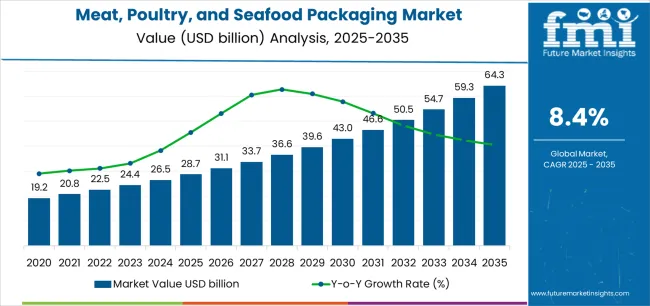
| Metric | Value |
|---|---|
| Estimated Value in (2025E) | USD 28.7 billion |
| Forecast Value in (2035F) | USD 64.3 billion |
| Forecast CAGR (2025 to 2035) | 8.40% |
Market expansion is being supported by the increasing global demand for protein products and the corresponding shift toward advanced preservation technologies that can provide superior shelf-life outcomes while meeting user requirements for food safety assurance and contamination-minimized handling processes. Modern processors are increasingly focused on incorporating packaging solutions that can enhance product protection while satisfying demands for transparent, consistently performing preservation and optimized distribution practices. Specialized packaging's proven ability to deliver freshness benefits, barrier effectiveness, and diverse application possibilities makes it an essential technology for quality-focused processors and safety-conscious distribution networks.
The growing emphasis on cold chain integrity and food waste reduction is driving demand for high-performance packaging systems that can support distinctive preservation outcomes and comprehensive quality positioning across fresh meat, poultry processing, and seafood distribution categories. User preference for technologies that combine barrier excellence with operational flexibility is creating opportunities for innovative implementations in both traditional and emerging protein applications. The rising influence of organized retail formats and export trade requirements is also contributing to increased adoption of advanced packaging that can provide authentic freshness benefits and extended distribution characteristics.
The market is segmented by packaging technology, material type, product type, packaging format, and region. By packaging technology, the market is divided into modified atmosphere packaging, vacuum packaging, skin packaging, and active packaging systems. Based on material type, the market is categorized into flexible plastics, rigid plastics, paper & paperboard, and aluminum materials. By product type, the market includes fresh meat, processed meat, poultry products, and seafood products. By packaging format, the market encompasses trays, pouches, bags, vacuum packs, and other formats. Regionally, the market is divided into North America, Europe, Asia Pacific, Latin America, Middle East & Africa, and other regions.
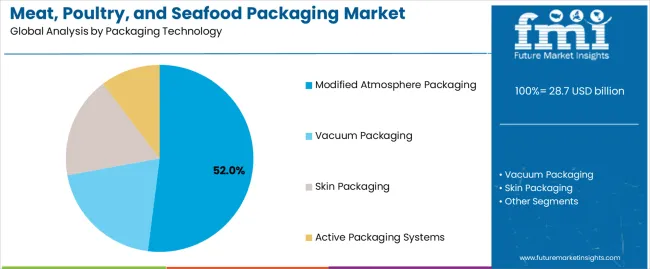
The modified atmosphere packaging segment is projected to account for 52% of the meat, poultry, and seafood packaging market in 2025, reaffirming its position as the leading technology category. Processors and distribution facilities increasingly utilize modified atmosphere packaging for their superior preservation characteristics, established shelf-life extension, and essential functionality in freshness maintenance applications across diverse protein categories. Modified atmosphere packaging's standardized performance characteristics and proven effectiveness directly address user requirements for reliable quality retention and optimal preservation value in commercial applications.
This technology segment forms the foundation of modern protein preservation patterns, as it represents the format with the greatest commercial acceptance potential and established compatibility across multiple distribution systems. Processor investments in cold chain optimization and quality standardization continue to strengthen adoption among safety-conscious manufacturers. With users prioritizing freshness integrity and distribution reliability, modified atmosphere packaging align with both preservation objectives and performance requirements, making them the central component of comprehensive protein handling strategies.
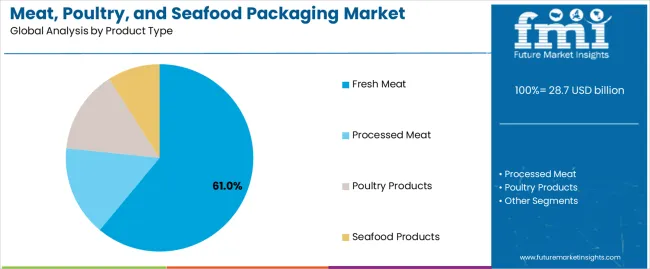
Fresh meat is projected to represent 61% of the meat, poultry, and seafood packaging market in 2025, underscoring its critical role as the primary application for quality-focused processors seeking superior preservation benefits and enhanced freshness credentials. Commercial users and retail chains prefer fresh meat applications for their established consumption patterns, proven market acceptance, and ability to maintain exceptional quality profiles while supporting premium offerings during diverse retail experiences. Positioned as essential applications for discerning processors, fresh meat offerings provide both volume excellence and differentiation advantages.
The segment is supported by continuous improvement in barrier film technology and the widespread availability of established cold chain infrastructure that enables quality assurance and premium positioning at the retail level. Additionally, packaging suppliers are optimizing material formulations to support market differentiation and accessible pricing. As packaging technology continues to advance and consumers seek fresh protein solutions, fresh meat applications will continue to drive market growth while supporting brand differentiation and consumer trust strategies.
The meat, poultry, and seafood packaging market is advancing rapidly due to increasing food safety consciousness and growing need for preservation solutions that emphasize superior freshness outcomes across retail segments and food service applications. However, the market faces challenges, including higher material costs for advanced barrier films, regulatory requirements for food contact materials, and disposal complexities affecting environmental performance. Innovation in biodegradable materials and intelligent monitoring systems continues to influence market development and expansion patterns.
The growing adoption of specialized packaging in cold chain logistics and international trade is enabling processors to develop distribution patterns that provide distinctive preservation benefits while commanding premium positioning and enhanced quality characteristics. Export applications provide superior shelf-life extension while allowing more sophisticated market reach across various geographic regions. Users are increasingly recognizing the competitive advantages of advanced packaging positioning for premium product protection and efficiency-conscious distribution integration.
Modern packaging manufacturers are incorporating advanced sensor systems, time-temperature indicators, and digital tracking protocols to enhance monitoring capabilities, improve quality outcomes, and meet commercial demands for comprehensive traceability solutions. These systems improve safety effectiveness while enabling new applications, including integrated supply chain platforms and specialized freshness verification programs. Advanced technology integration also allows manufacturers to support premium market positioning and transparency leadership beyond traditional packaging operations.
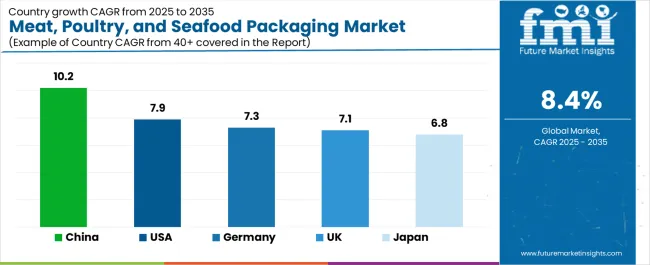
| Country | CAGR (2025-2035) |
|---|---|
| USA | 7.9 |
| Germany | 7.3 |
| UK | 7.1 |
| China | 10.2 |
| Japan | 6.8 |
The meat, poultry, and seafood packaging market is experiencing robust growth globally, with China leading at a 10.2% CAGR through 2035, driven by the expanding protein consumption sector, growing cold chain penetration, and increasing adoption of packaged meat products. The USA follows at 7.9%, supported by rising food safety standards, expanding retail infrastructure, and growing acceptance of modified atmosphere packaging solutions. Germany shows growth at 7.3%, emphasizing established meat processing industries and comprehensive quality assurance development. The UK records 7.1%, focusing on premium fresh products and regulatory compliance expansion. Japan demonstrates 6.8% growth, prioritizing quality packaging solutions and technological advancement.
The report covers an in-depth analysis of 40+ countries; five top-performing countries are highlighted below.
Revenue from meat, poultry, and seafood packaging consumption and sales in the USA is projected to exhibit exceptional growth with a CAGR of 7.9% through 2035, driven by the country's rapidly expanding retail meat sector, favorable regulatory frameworks toward food safety, and initiatives promoting cold chain optimization across major processing regions. The USA's position as a leading protein market and increasing focus on quality assurance development are creating substantial demand for high-performance packaging in both commercial and specialty markets. Major processors and packaging suppliers are establishing comprehensive production capabilities to serve growing preservation demand and emerging distribution opportunities.
Revenue from meat, poultry, and seafood packaging products in Germany is expanding at a CAGR of 7.3%, supported by rising meat processing sophistication, growing export orientation, and expanding quality infrastructure. The country's developing cold chain capabilities and increasing commercial investment in barrier technologies are driving demand for advanced packaging across both imported and domestically processed applications. International packaging companies and domestic suppliers are establishing comprehensive operational networks to address growing market demand for quality packaging and preservation solutions.
Revenue from meat, poultry, and seafood packaging products in the UK is projected to grow at a CAGR of 7.1% through 2035, supported by the country's mature retail market, established food safety culture, and leadership in quality standards. Britain's sophisticated distribution infrastructure and strong support for traceability are creating steady demand for both traditional and innovative packaging varieties. Leading retail chains and processing facilities are establishing comprehensive operational strategies to serve both domestic markets and growing export opportunities.
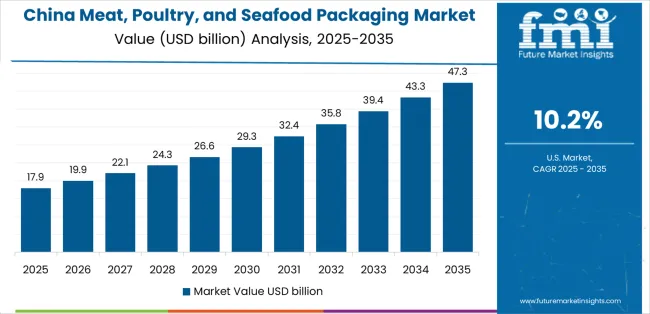
Revenue from meat, poultry, and seafood packaging products in China is projected to grow at a CAGR of 10.2% through 2035, driven by the country's emphasis on protein consumption expansion, processing modernization, and sophisticated cold chain capabilities for products requiring specialized preservation varieties. Chinese processors and distributors consistently seek commercial-grade technologies that enhance product quality and support retail operations for both traditional and modern protein applications. The country's position as an Asian consumption leader continues to drive innovation in specialty packaging applications and commercial preservation standards.
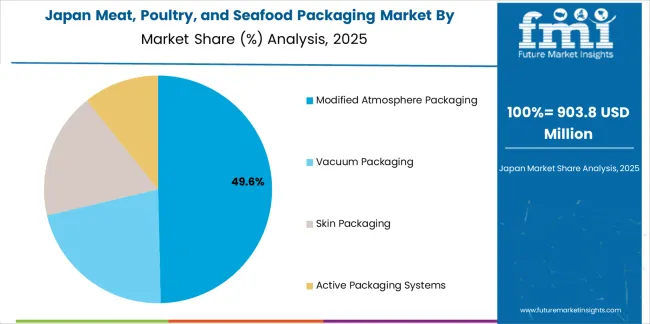
Revenue from meat, poultry, and seafood packaging products in Japan is projected to grow at a CAGR of 6.8% through 2035, supported by the country's emphasis on quality assurance, food safety standards, and advanced technology integration requiring efficient preservation solutions. Japanese processors and retail brands prioritize freshness performance and barrier effectiveness, making advanced packaging essential technology for both traditional and modern protein applications. The country's comprehensive quality excellence and advancing consumption patterns support continued market expansion.
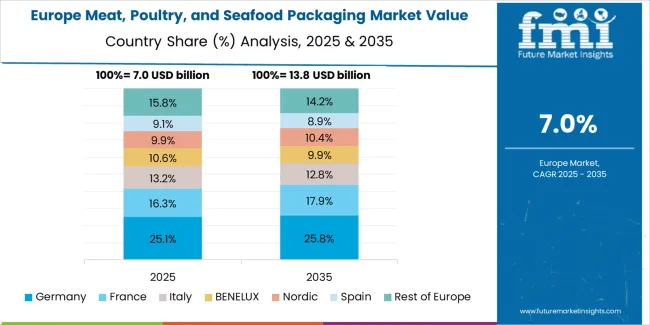
The Europe meat, poultry, and seafood packaging market is projected to grow from USD 9.8 billion in 2025 to USD 20.4 billion by 2035, recording a CAGR of 7.6% over the forecast period. Germany leads the region with a 36% share in 2025, moderating slightly to 35.5% by 2035, supported by its strong meat processing culture and demand for premium, quality-assured packaging products. The United Kingdom follows with 24% in 2025, easing to 23.5% by 2035, driven by a sophisticated retail market and emphasis on food safety and traceability standards. France accounts for 18.5% in 2025, rising to 19% by 2035, reflecting steady adoption of advanced preservation solutions and quality consciousness. Italy holds 9% in 2025, expanding to 9.5% by 2035 as premium product innovation and specialty protein applications grow. Spain contributes 7.5% in 2025, growing to 8% by 2035, supported by expanding processing capacity and export-oriented handling. The Nordic countries rise from 4% in 2025 to 4.5% by 2035 on the back of strong safety adoption and advanced cold chain integration. BENELUX remains at 1% share across both 2025 and 2035, reflecting mature, quality-focused markets.
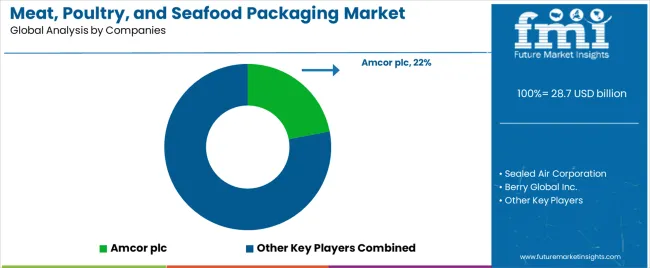
The meat, poultry, and seafood packaging market features 12–18 players with moderate concentration, where the top three companies collectively hold around 46–52% of global market share, driven by advanced barrier film technologies, strong hygiene compliance, and long-standing partnerships with meat processors, retailers, and cold-chain distributors. The leading company, Amcor plc, commands roughly 22% market share, supported by its extensive portfolio of high-barrier flexible packaging, vacuum skin packaging (VSP), and modified-atmosphere packaging (MAP) solutions designed to extend shelf life and ensure product safety. Competition centers on oxygen/moisture barrier performance, sealing integrity, food safety certifications, and sustainability rather than price competition alone.
Market leaders such as Amcor plc, Sealed Air Corporation, and Berry Global Inc. maintain dominant positions by offering high-performance packaging formats that enhance freshness, reduce spoilage, and support chilled and frozen distribution. Their strengths include advanced co-extruded films, antimicrobial packaging solutions, and strong relationships with multinational meat processors.
Challenger companies including Coveris Holdings S.A., Mondi Group, and Winpak Ltd. compete through specialized MAP trays, recyclable film structures, and custom packaging formats for premium meat and seafood applications.
Additional competition arises from Multivac SE, DuPont de Nemours Inc., Graphic Packaging International, and Amcor’s Bemis Division, which strengthen their positions through thermoforming technologies, paper-based alternatives, and integrated packaging-machine systems tailored to high-volume protein processors.
The success of meat, poultry, and seafood packaging in meeting commercial preservation demands, food safety requirements, and quality assurance integration will not only enhance freshness outcomes but also strengthen global protein supply chain capabilities. It will consolidate emerging regions' positions as hubs for efficient cold chain management and align advanced economies with modern food safety systems. This calls for a concerted effort by all stakeholders -- governments, industry bodies, processors, distributors, and investors. Each can be a crucial enabler in preparing the market for its next phase of growth.
How Governments Could Spur Local Production and Adoption?
How Industry Bodies Could Support Market Development?
How Distributors and Retail Players Could Strengthen the Ecosystem?
How Processors Could Navigate the Shift?
| Items | Values |
|---|---|
| Quantitative Units (2025) | USD 28.7 billion |
| Packaging Technology | Modified Atmosphere Packaging, Vacuum Packaging, Skin Packaging, Active Packaging Systems |
| Material Type | Flexible Plastics, Rigid Plastics, Paper & Paperboard, Aluminum Materials |
| Product Type | Fresh Meat, Processed Meat, Poultry Products, Seafood Products |
| Packaging Format | Trays, Pouches, Bags, Vacuum Packs, Other Formats |
| Regions Covered | North America, Europe, Asia Pacific, Latin America, Middle East & Africa, Other Regions |
| Countries Covered | United States, Germany, United Kingdom, China, Japan, and 40+ countries |
| Key Companies Profiled | Amcor plc, Sealed Air Corporation, Berry Global Inc., Coveris Holdings S.A., Mondi Group, Winpak Ltd., Multivac Sepp Haggenmüller SE & Co. KG, DuPont de Nemours Inc., Graphic Packaging International LLC, and Amcor’s Bemis Division |
| Additional Attributes | Dollar sales by packaging technology, material type, product type, packaging format, and region; regional demand trends, competitive landscape, technological advancements in barrier engineering, cold chain integration initiatives, quality enhancement programs, and premium product development strategies |
The global meat, poultry, and seafood packaging market is estimated to be valued at USD 28.7 billion in 2025.
The market size for the meat, poultry, and seafood packaging market is projected to reach USD 64.3 billion by 2035.
The meat, poultry, and seafood packaging market is expected to grow at a 8.4% CAGR between 2025 and 2035.
The key product types in meat, poultry, and seafood packaging market are modified atmosphere packaging, vacuum packaging, skin packaging and active packaging systems.
In terms of product type, fresh meat segment to command 61.0% share in the meat, poultry, and seafood packaging market in 2025.






Our Research Products

The "Full Research Suite" delivers actionable market intel, deep dives on markets or technologies, so clients act faster, cut risk, and unlock growth.

The Leaderboard benchmarks and ranks top vendors, classifying them as Established Leaders, Leading Challengers, or Disruptors & Challengers.

Locates where complements amplify value and substitutes erode it, forecasting net impact by horizon

We deliver granular, decision-grade intel: market sizing, 5-year forecasts, pricing, adoption, usage, revenue, and operational KPIs—plus competitor tracking, regulation, and value chains—across 60 countries broadly.

Spot the shifts before they hit your P&L. We track inflection points, adoption curves, pricing moves, and ecosystem plays to show where demand is heading, why it is changing, and what to do next across high-growth markets and disruptive tech

Real-time reads of user behavior. We track shifting priorities, perceptions of today’s and next-gen services, and provider experience, then pace how fast tech moves from trial to adoption, blending buyer, consumer, and channel inputs with social signals (#WhySwitch, #UX).

Partner with our analyst team to build a custom report designed around your business priorities. From analysing market trends to assessing competitors or crafting bespoke datasets, we tailor insights to your needs.
Supplier Intelligence
Discovery & Profiling
Capacity & Footprint
Performance & Risk
Compliance & Governance
Commercial Readiness
Who Supplies Whom
Scorecards & Shortlists
Playbooks & Docs
Category Intelligence
Definition & Scope
Demand & Use Cases
Cost Drivers
Market Structure
Supply Chain Map
Trade & Policy
Operating Norms
Deliverables
Buyer Intelligence
Account Basics
Spend & Scope
Procurement Model
Vendor Requirements
Terms & Policies
Entry Strategy
Pain Points & Triggers
Outputs
Pricing Analysis
Benchmarks
Trends
Should-Cost
Indexation
Landed Cost
Commercial Terms
Deliverables
Brand Analysis
Positioning & Value Prop
Share & Presence
Customer Evidence
Go-to-Market
Digital & Reputation
Compliance & Trust
KPIs & Gaps
Outputs
Full Research Suite comprises of:
Market outlook & trends analysis
Interviews & case studies
Strategic recommendations
Vendor profiles & capabilities analysis
5-year forecasts
8 regions and 60+ country-level data splits
Market segment data splits
12 months of continuous data updates
DELIVERED AS:
PDF EXCEL ONLINE
Market Share Breakdown of Meat, Poultry, and Seafood Packaging Manufacturers
Meat Packaging Market Trends - Growth & Forecast 2025 to 2035
Analyzing Meat Packaging Market Share & Industry Growth
Meat Packaging Films Market
Seafood Packaging Market Size and Share Forecast Outlook 2025 to 2035
Seafood Packaging Market Size, Share & Forecast 2025 to 2035
Poultry Packaging Market Insights - Trends & Future Outlook 2025 to 2035
Evaluating Seafood Packaging Market Share & Provider Insights
Processed Meat Packaging Market Growth & Trends 2024 to 2034
Plant Based Meat Packaging Market Size and Share Forecast Outlook 2025 to 2035
North America Fresh Meat Packaging Market Size and Share Forecast Outlook 2025 to 2035
Poultry Cutting System Market Size and Share Forecast Outlook 2025 to 2035
Meat Snacks Market Size and Share Forecast Outlook 2025 to 2035
Packaging Supply Market Size and Share Forecast Outlook 2025 to 2035
Seafood Farming Chillers Market Forecast and Outlook 2025 to 2035
Packaging Testing Services Market Size and Share Forecast Outlook 2025 to 2035
Packaging Tubes Market Size and Share Forecast Outlook 2025 to 2035
Meat Alternative Market Forecast and Outlook 2025 to 2035
Packaging Jar Market Forecast and Outlook 2025 to 2035
Packaging Barrier Film Market Size and Share Forecast Outlook 2025 to 2035

Thank you!
You will receive an email from our Business Development Manager. Please be sure to check your SPAM/JUNK folder too.
Chat With
MaRIA